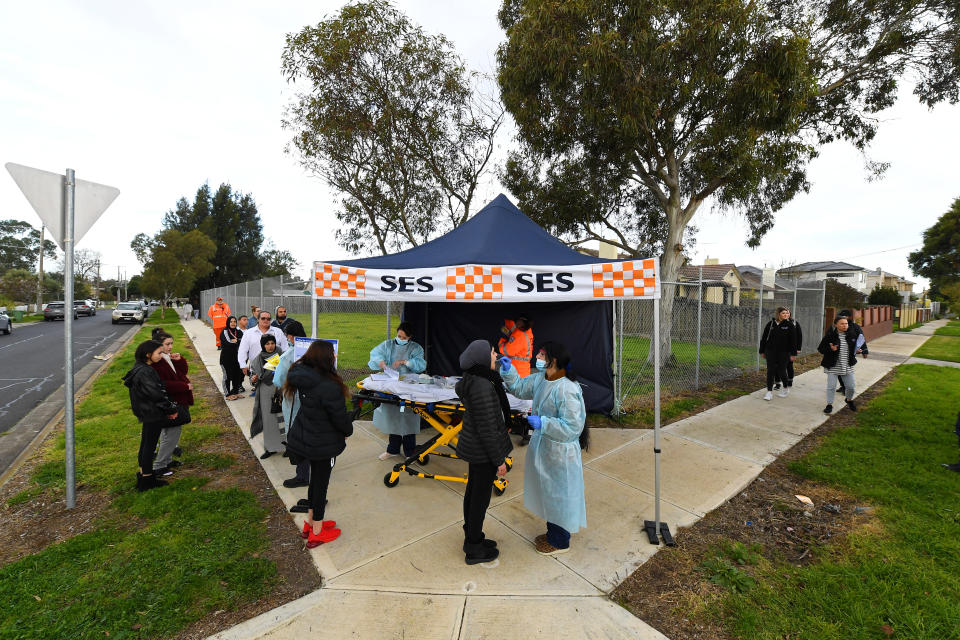Revealed: The three reasons why hundreds in virus-hit state are refusing testing
Victorian Premier Daniel Andrews has said the issue of hundreds of Melburnians refusing coronavirus tests is “more complex than it seems”, and revealed he is unlikely to enforce compulsory involvement in an ongoing testing blitz.
Mr Andrew's stance comes as the three reasons people may be reluctant to undergo the testing were explained.
A fear of missing income from work, concern about a child undergoing testing and a lack of understanding of the importance of testing due to language problems have all been outlined as barriers to participating in the tests.
On Wednesday, the state confirmed a further 73 cases while at midnight 10 postcodes, incorporating 36 suburbs and 300,000 people, were plunged into a stringent lockdown for four weeks.
After revealing on Tuesday nearly a thousand residents in hotspots Keilor Downs and Broadmeadows had refused tests, pressure has begun to mount for the state to fine or sanction those refusing to be tested.
Prime Minister Scott Morrison threw his support behind the idea on Wednesday, saying he was “disappointed” with the high number of people refusing tests.
Mr Andrews however, distanced himself from such a move on Wednesday, telling Channel 10’s The Project that process would be too laborious and time consuming and at a time when resources are stretched to their limits.
“I think you have to be careful here,” he told host Lisa Wilkinson.

“If I have to have a police officer standing beside every public health officer going door-to-door to take tests, because they are the only ones who can enforce orders, that is less tests that we can get done and that is less data and it makes it harder for us to have a public health response.”
Mr Andrews said while the issue is “deeply frustrating”, he said making the system “too onerous” could mean people in those hotspots won’t even answer their door.
Three main reasons why people are refusing tests
The premier also noted it was vital to understand why people were refusing tests to allow the authorities to make changes.
Mr Andrews said some people are likely refusing tests due to their economic situation and cannot afford to take two days off work while awaiting the results of a test.
“The notion of having two days away from work while you wait for your test result may be a big challenge,” he said.
There's some confusion around parts of Victoria's local lockdown. We spoke to Premier Dan Andrews for some clarity on what the rules are, what needs to happen to for us to move forward, and how everybody in the state - and country - can do to get us back on track. pic.twitter.com/REtCFSvufH
— The Project (@theprojecttv) July 1, 2020
He added the state has put in place funding that will provide those forced to quarantine or self-isolate with a one-off $1,500 payment.
Acting Chief Medical Officer Paul Kelly earlier said parents who did not want their children subject to invasive testing made up a significant number of people who had refused tests. Victoria has now rolled out a saliva test in a bid to improve numbers.
Mr Kelly also said the diversity of the suburbs under the spotlight has also proven difficult, a concern that on Sunday prompted a handful of Melbourne mayors to write to Mr Morrison and Mr Andrews asking for more resources to be able to relay information to communities who weren’t fluent in English.

“Explaining about the COVID-19 element and why it’s important is a really key component,” Mr Kelly said.
“This is a very multicultural area of Melbourne. Many different ethnic groups and language groups and so not only the translation but also the cultural sensitivity is a really important component and Victorians realise that.”
Yet Mr Andrews has warned police will “actively” enforce the new restrictions which will mean people living in the 10 postcodes will only be able to leave home for work or school, essential shopping, receive or give care and exercise.
He said police would be randomly stopping people, including motorists, with fines of up to $1652 handed out if people are not complying.
One of Australia’s leading epidemiologists, Professor Mary-Louise McLaws, who is an advisor to the World Health Organisation, has called for the state to adopt a more draconian approach which Chinese governments have successfully rolled out in Wuhan and Beijing where suburbs are completely shut off from the rest of the city.
“It’s not pleasant but it does work,” she told ABC News 24.
Do you have a story tip? Email: newsroomau@yahoonews.com.
You can also follow us on Facebook, Instagram and Twitter and download the Yahoo News app from the App Store or Google Play.




